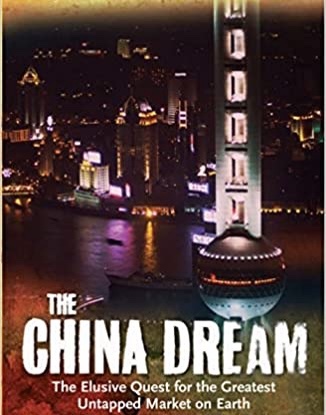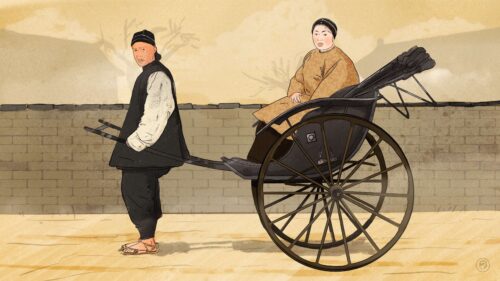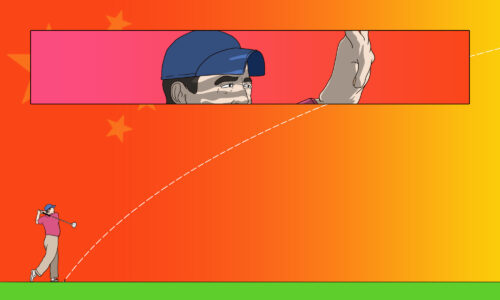This is book No. 2 in Paul French’s Ultimate China Bookshelf.

Blurbs:
“The China Dream is a book that will have the business and political worlds talking about what’s really going on in China…The much-needed antidote to the delusions…about the riches to be made from investing and selling in China.”
—Washington Post
“An entertaining, if cautionary, tale of Western business woes in China, stretching back seven hundred years.”
—Wall Street Journal
“Studwell records the follies of Westerners who deluded themselves about the possibilities of the China market. Today, many still naively expect to get rich there.”
—Foreign Affairs
“Joe Studwell should be named chief myth-buster for Asian business.”
—Financial Times
About the author:
Joe Studwell graduated from Bristol University and went to Asia writing for the Economist Intelligence Unit. Based in Beijing, he founded the highly regarded China Economic Quarterly in 1997. The China Dream was his first book.
The book in 150 words:
In The China Dream, Studwell delivered a methodical deconstruction of the myth surrounding the China market in the 1990s and turn of the century. The tales obsessing the minds of governments and the heads of large corporations in the West to the point of delirium. The book took its inspiration from Carl Crow’s 400 Million Customers (book No. 1 on the Ultimate China Bookshelf) and sought to update his 1937 hypothesis that the China market was horrendously overhyped. More analytical than Crow, Studwell also aimed to systematically expose the problems with China’s economic statistics that led to errors in most projections about the country. The market grew but competition, copycatting, and higher-than-expected costs all combined to erode profitability. He provides a plethora of case studies, notably GE’s disastrous dive into the light bulb market before subsequent successes in aircraft leasing and medical equipment. Studwell believed China was destined to become the world center for manufacturing, but that it would be concentrated at the low-end and therefore not a path to great social enrichment.
Your free takeaways:
Their (foreign firms) predicament is summed up by Alan Smith, the former chairman of Hong Kong investment bank Jardine Fleming: “China is too big to ignore,” he says, “and too difficult to make any money.” This is the point on which the China Dream impales its many victims.
People have been betting on China for centuries and will continue to do so. Despite all the evidence that only the tiniest minority strikes it rich in the Chinese domestic market, there is never any shortage of corporate gamblers.
As Carl Crow intimated in the 1930s, the invention of the calculating machine — not to mention more recent creations such as the business consultant — have only encouraged the ancient art of speculation on what sales a company might achieve if only a large part of the Chinese population would buy its goods or services.
At times when the economies of developed countries are weak, as during the Great Depression, the early 1990s and the first years of the new millennium, the China Dream has a particular potency because it stands out in starkest relief from the mundane reality of normal business life. It is at just these times that gamblers place their biggest bets on the propositions with the longest odds and the largest potential returns.
Why this book should be on your China bookshelf:
If the broader message of our first entrant on the Ultimate China Bookshelf, Carl Crow’s 400 Million Customers, was the importance of retaining a foreign collective memory of China’s past, then Joe Studwell’s The China Dream is in many ways an echo of Crow’s appeal for business people to be realistic. The “China Dream” (predating Xí Jìnpíng’s 习近平 own version by a decade) was good — inspiring, challenging, hopeful. But ultimately, today’s unrealistic dreams led to tomorrow’s nightmares. Crow lamented the poor businessmen of his day that dreamt of buying yachts with their China profits only to lose their shirts. Studwell used the illustration of the slumbering businessman who wafts away on visions of China but would never dream of Denmark. What Studwell then proceeded to show, among much else, was that Denmark often turned out to be the market that delivered a profit while China became a corporate money pit where executive dreams died horrible screaming deaths.
It may be hard for many to believe it in 2022, such has been the long-term impact of Studwell’s book (and its legions of less well researched and written imitators over the years), but The China Dream was often a tough sell back in the day. Studwell faced often intensely hostile crowds on the speaking circuit. None less so than in China. I well recall the official Shanghai book launch along Hengshan Lu in a drab ballroom at the old Regal International East Asia Hotel on a stormy Thursday night. Various “Chief Reps,” “Commercial Chargés” from the consulates, as well as the self-appointed “Old China Hands” almost to a man (and it was 99% men) disgorged from battered VW Santana taxis to disagree vehemently with the author.
Interestingly, and again harking back to Crow, and indicating just how much of a sea change Studwell’s analysis was, the main argument was either “I know someone who made money” or “all will come right eventually.” Anyone perceived to be a doomsayer — and in 2003 Studwell was the “China Doomsayer-in-Chief” — was castigated. The irony of having not read Crow and now vehemently professing their own “China Dream” was seemingly lost on them. One then rather well-known and famously self-important “China Consultant” with a slightly dubious name and who regularly boasted of schmoozing tax officials from Ningxia to Mudanjiang turned a rather gammony shade of scarlet pink and became apoplectic at the very thought that the China Dream might, in the vast majority of cases, be an illusion, and one that he had actively sold day-in-day-out. This was not what he had come to hear! Sacrilege, apostasy, treachery! Achieving the “China Dream” required everyone to play the China Game and agree it was great.
But Studwell had been observant — not least on the endless stream of trade missions that he encountered in Beijing. Now almost totally derided as dubious ways to spend public money on mutually pointless backslapping fests, trade missions were once quite the highlight of the China Dream. Politicians a
nd businesspeople arrived on 747s and Airbuses to sign improbable volumes of deals the former’s voters would hopefully be impressed by and the latter’s shareholders believed in. Studwell showed that precious little of what was announced ever materialized as the baijiu and hope flowed in equal measure while the “China Dream” turned Technicolour, Surround Sound, and IMAX in its proportions. Double-counting, deal inflation, rehashing last year’s numbers…nothing was ever as promised.
But back in the late 1990s and early 2000s, trade missions were seen as crucial to securing access to the China market. Slick-suited business consultants stuck to visiting delegates like barnacles to an old tramp steamer looking for a cargo, any cargo…please just some cargo! Second-string politicians tagged along, hungry for photo opportunities, seduced by big red banners across the hotel entrance, over-stuffed chairs with antimacassars and ceramic spittoons. Everyone quaffed tepid Dynasty wine, slammed Maotai (Dan Rather’s famous “liquid razor blades”) and, for it was after all the ’90s and this was indeed China, chain smoked Zhongnanhais right there at the table. Truly the good old days. Well, Studwell, the great party-pooper, stuck his finger right in their collective eye.
Many accused Studwell of being solely pessimistic, unable to see any rays of light, any positivity. It’s true, the author did rather accentuate the negative. After so many years of unrealistic positivity, whether in wishful corporate balance sheet projections or the snake oil salesmen of the long-running China consultancy grift, foreign business had been overly optimistic and, basically, in denial. A correction was needed, and Studwell’s The China Dream provided it.
Studwell went on to excoriate and reveal the secret world of the business tycoon families and confined business elites of Hong Kong and Southeast Asia in Asian Godfathers (2008), and then to take a perhaps more forensic look at the East Asian economic miracle/tragedy of the 1990s in How Asia Works, a book much-praised by no lesser personage than Bill Gates. Both were well-researched and often provocative books, though quite how Studwell managed to publish Asian Godfathers without getting his legs broken one dark night is still one of the Asian publishing trade’s most inexplicable mysteries. Many of the tycoons profiled cannot have been happy when they got their free copy in the post! But neither quite struck a nerve the way The China Dream did. After that book, no informed and honest discussion of business in China was ever the same again.
Next:
We’ve seen that the foreign collective memory of China is a fragile thing we lose at our peril. Then we’ve seen that a healthy dose of realism and skepticism can be positive business attributes when working in China, rather than relying on hope and dreams. So next on the Ultimate Bookshelf we need to consider nostalgia. A problem so easy to indulge in, and often very enjoyable too. But one that can cloud our understanding of China and leave us stunned and cynical when the sentimentality rapidly recedes in the face of reality.
Check out the other titles on Paul French’s Ultimate China Bookshelf.







